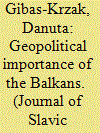| Srl | Item |
| 1 |
ID:
123224


|
|
|
|
|
| Publication |
2013.
|
| Summary/Abstract |
The aim of this article is to examine the terrorism in the Balkans. Contemporary Islamic terrorism in the Balkans is caused by the increase of influences of Muslim fundamentalists, especially in Bosnia and Herzegovina. The origins of Islamic terrorism are connected with radical trend of this religion, which became popular in the society in the period of socialist Yugoslavia. However, this trend could be widespread on a larger scale only when Mujahideen came to Bosnia and Herzegovina to take part in the civil war. In Bosnia and Herzegovina, it was the religious fanatics who mainly participated in the fighting. Many of them were the members of terroristic organizations, such as Al-Qaeda, Hezbollah, Hamas, and Al-Gama'a al-Islamiyya. A considerable number of 'Warriors of Allah' remained on the territory of Bosnia and Herzegovina after the end of the civil war, thus, contributing to the development of the terrorist network connected with radical factions of Islam. The author emphasizes that is essential to take complex actions that aim to fight this threat by international cooperation of special services and the police as a part of the European Union (UE) mission. It is even more important since West Balkans actively participate in the UE and North Atlantic Treaty Organization (NATO) integration processes.
|
|
|
|
|
|
|
|
|
|
|
|
|
|
|
|
| 2 |
ID:
175649


|
|
|
|
|
| Summary/Abstract |
The Balkan Peninsula, located in South-Eastern Europe, is the fourth of the large European Peninsulas. The Balkans are considered the least known part of the Old Continent, which has for centuries been the scene of conflicts and wars. This article presents the geographical location of the Balkans and analyzes geopolitical theories that refer to this region. The main aim of the article is to show that the Balkans were subject to complex geopolitical processes and are still a zone of instability in Europe. This region is characterized by an extraordinary dynamic of change, which is a consequence of the interrelationship between geography and history. The post-Cold War enlargement of NATO and the EU shows that the border of geopolitical influence has shifted significantly and that the area of the Balkans has partly lost its former position as a border region.
|
|
|
|
|
|
|
|
|
|
|
|
|
|
|
|